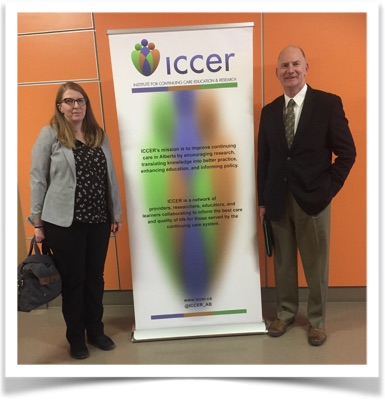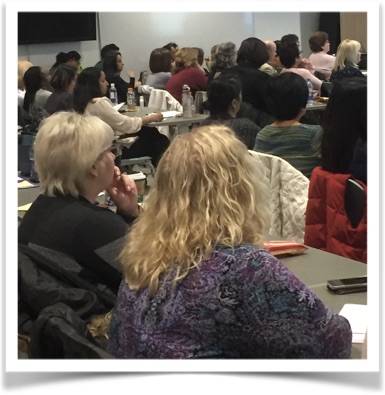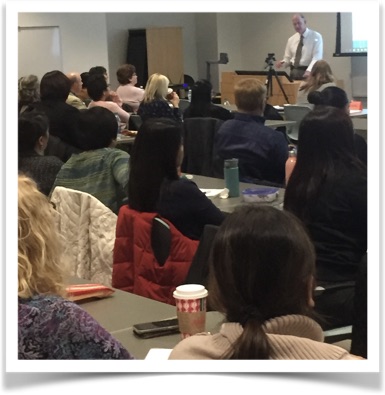Education Sessions
Dr. Lisa Howard, University of Lethbridge, presented ‘Sexual Expression in Continuing Care Homes: Perspectives of Managers, Leaders, Family Members & Residents’. A link to the recorded webinar is available on the members’ only pages.
Serious Games - Vibrant Minds & Virtual Gym with Dr. Adriana Rios Rincon & Victor Fernandez, University of Alberta. A link to the recorded webinar is available on the organizational & associate members’ only pages.
Designing Principles in Memory Care Facilities with George Berry and Caitlin Wilson, Berry Architecture. A link to the recorded webinar is available on the organizational & associate members’ only pages.
Initiating conversations about resident sexual expression in AB continuing care homes: A panel discussion with Dr. Lisa Howard, Jodie Cuff, and Colleen Torgunrud. A link to the recorded webinar is available on the organizational & associate members’ only pages. Some additional resources are listed below:
- Vancouver Coastal Health Authority (2009). Supporting Sexual Health & Intimacy in Care Facilities: Guidelines for Supporting Adults Living in LTC Facilities and Group Homes in BC, Canada
- The Society for Post-Acute and Long Term Care Medicine (2016). Capacity for Sexual Consent in Dementia in LTC
- The International Longevity Centre – UK (2011). The Last Taboo: A guide to dementia, sexuality, intimacy and sexual behavior in care homes
- Alzheimer’s Australia (2010). Quality Dementia Care: Understanding dementia care and sexuality in residential facilities
- Office of the State LTC Ombudsman (2016). Sexual Expression Policy Development: A guide for LTC facilities and assisted living programs
- Bradley, Catherine (2016). Supporting Intimacy in the Rehabilitative, Assisted and Long Term Care Settings. 32: 2. Topics in Geriatric Rehabilitation (218 – 220)
- Spinal Cord Injury Organization of BC (2013). Supporting Sexual Health & Intimacy in Care Facilities: A pocket reference guide
- Lanark, Leeds and Grenville LTC Working Group (2010). Intimacy and Sexuality in LTC. A guide to practice: resource tools for assessment and documentation
Best practices in design for congregate living with Dr. Megan Strickfaden. A link to the recorded webinar is available on the organizational & associate members’ only pages.
Aging & LGBT+: Housing Fears & Considerations with Amanda Weightman and Rocky Wallbaum. A link to the recorded webinar is available on the organizational & associate members’ only pages.
Dr. Lisa Howard, University of Lethbridge, presented ‘Sexual Expression in Continuing Care Homes: Perspectives of Managers, Leaders, Family Members & Residents’. A link to the recorded webinar is available on the members’ only pages.
On November 12th, 2019 ICCER was pleased to host an education program “Intergenerational Programming”. Our speakers, in Edmonton and Calgary, presented to our audience across Alberta, and once again including New Brunswick.
Presentations for the day:
- Sandra Woodhead Lyons: Introductions and Agenda
- Diana O’Donoghue & Kim Turcotte: Intergenerational Toolkit
- Salima Suleman: Innovative Intergenerational Initiatives from Age Friendly Edmonton
- Jan Hrasko: Hope Kids: A 20+ Year Intergenerational Partnership
- Ruby Lecot: Better Together - Intergenerational Programs in Care Centres & Community
- Harley Hempel: Intergenerational Programming - An Agency Perspective

On November 14th, 2018, ICCER hosted a one-day session on Palliative Care & End of Life Care in Continuing Care. Our speakers, in Calgary and Edmonton, presented to an audience across Alberta, and including New Brunswick.



Presentations for the day:
- Sandra Woodhead Lyons: Introductions and Agenda
- Katherine Duthie: What can we learn from the 5 wishes? Ethical Issues at End of Life
- Brenda Slobozian: Health Care Aide Palliative Care Competencies in Long Term Care
- Sandra Cook-Wright: One Organization’s Approach to Palliative Care Support and Training
- Douglas Faulder: Medical Assistance in Dying In Alberta Two Years After Bill C-14
- Katherine Duthie: Deepening Perspectives on Medical Assistance in Dying: A values-based approach
On January 23, 2018, Coach Mark Marcynuk and Sandra Woodhead Lyons presented the workshop Communication Tools to Enhance Care to 23 individuals in Fort Chipewyan.

On November 22nd, ICCER was pleased to go to Fort McMurray and present a one-day in-person education event - Communication Tools to Enhance Care. Coach Mark Marcynuk and Sandra Woodhead Lyons presented the workshop to 41 extremely engaged participants. It was a pleasure meeting and working with them.

On November 15th, 2017, ICCER and the Injury Prevention Centre hosted a one-day session on Falls Prevention in Continuing Care and the Community. Our speakers for the day presented on a variety of topics, including the role of technology in falls prevention, physical literacy, concussions in seniors and falls risk management strategies. We had host sites in both Edmonton and Calgary, with about 75 and 50 attendees at each, as well as 48 participants listening via teleconference and 30 videoconference sites booked across the province! It was our first time partnering with the Injury Prevention Centre and we look forward to continuing our relationship with them.

Presentations for the day:
- Welcome & Introductions Sandra Woodhead Lyons, Executive Director, ICCER; Dr. Kathy Belton, Associate Director, IPC
- Technological Revolution: Falls and Injury Prevention - Emily Post, AHS
- Falls Risk Management Strategy: What do I need to know? - Jodie Breadner, AHS
- Physical Literacy - Andy Kitchen, City of Calgary
- Concussions in Seniors - Dr. Wasif Hussain, University of Alberta
- Piloting a Falls Strategy at St. Marguerite Manor - Karen LaValley, AHS
On November 6th ICCER , Room 217 Foundation and the Winspear Centre held Music Care Conference 2017 in Edmonton. We had 200 people attending from all over Alberta.

Here are links to some of our main speakers:
- Dr. Corene Thaut, The Academy of Neurologic Music Therapy
- Julian West, Creative Music Leader
- Jennifer Buchanan, JB Music Therapy
- Sean McCann, Musician , Inspirational Speaker
- Sherryl Sewepagaham, Singer, Songwriter, Educator
- Nadia Chana, Singer, Ethnomusicologist
- Kim Dennis, Singer, Conductor and voice teacher
On February 23rd, 2017 ICCER was pleased to present a full-day education session, Responsive Behaviours 2017 – Communication Tools to Enhance Care, to help support person and family-centred care by encouraging a mindful approach to communication with individuals with responsive behaviours and other communication barriers.

Our speakers, Mark Marcynuk and Dr. Jeff Small provided practical ideas for communication based in theory and research.
At the beginning of the session participants were asked to write down what their intentions for the day were, and to identify why they wanted to improve their communication. The intent of the day was for each participant to take home at least 2-3 easily implementable ideas for improving communication with residents/family members. They were asked to go back to their sites and share this knowledge with their colleagues.
The speakers encouraged questions and audience participation. We have to thank Jo-Anne Henson (UofA), Audrey Sand (CapitalCare), and Lynn Moulton (AHS) for their wonderful contributions.
The main site was in Edmonton Clinic Health Academy, where we had 80 participants. There were also about 35-40 videoconference sites registered, including 3 from Ontario, 1 from New Brunswick, and 1 from Nova Scotia.
Presentations were:
On November 17th, 2016, ICCER Steering Committee member Dr. Erika Goble spoke at the Alberta Association on Gerontology networking dinner on "Is it Time to Stop Searching for a Magic Bullet? Re-examining the Role of Family-Staff Relationships in Quality Continuing Care".
Family/staff relationships are very important in the continuing care sector. Dr. Goble spoke November 2015 on Family & Staff Perspectives on Behaviours that Support Relationships. Her 2016 presentation built on that presentation by including information from her work in evaluating the implementation of the Butterfly Model with Lifestyle Options, as well as her work on moral distress, compassion fatigue, and a recent examination of front-line experiences of continuing care.
ICCER hosted "Implementing Music Care in Continuing Care" on November 9th 2016. We had two main sites (Edmonton Clinic Health Academy in Edmonton and Rockyview in Calgary), with an additional 25 sites joining by videoconference (from High Level in the north to Milk River in the south!) and over 30 teleconference lines.

The speakers were:
- Sandra Woodhead Lyons, Executive Director, ICCER - Introductions and considerations before implementing music care
- Steve Friesen, Acting Manager of Quality and Resident Safety at Bethany Care Society - Music care: Current reality and future directions
- Andrea Capowski, Recreation Therapist and Gabrielle Cleary, Recreation Therapist, Lifestyle Options Riverbend - Java music club in practice
- Kelly Deis, Project Coordinator, Campus of Wellness & Care Demonstration Project, Shepherd’s Care - Kensington Village - Music Listening Pilot Project
- Liz Tanti, Administrator, CapitalCare Strathcona - The magic of music: Creating moments that unveil the person within
- Sandra referred to Room 217 Foundation's 10 Dimensions of Music Care.
In April and May 2016 Dr. Sienna Caspar led six evidence-based workshops across Alberta on Creating Cultures of Care through Responsive Leadership. Workshops were held in Lethbridge on April 18, Edmonton May 4 to 6, and Calgary May 10 and 11. Each session focused on the use of daily care team huddles as a method of cultivating collaborative decision making, leading to improved resident care outcomes. The topics of the workshop included: strength-based leadership, five key leadership skills, mindfulness, relationship building and collaboration.
On November 10th 2015 ICCER hosted an education session on Family/Staff Relationships in Continuing Care. We had 65 people in-person at Edmonton Clinic Health Academy, plus 41 teleconference lines and 21 videoconference sites.
The speakers have made their presentations available:
- Introduction and agenda
- Erika Goble – “It’s the little things that count: Family and staff perspectives on behaviours that support relationships”
- Gary Goldsand – “When sharing fails: Ethical strategies for clinicians when surrogates disagree”
- E. Sharon Brintnell – “What families and patients say about their needs and interactions with professionals”
On February 18, 2015 we hosted an education session examining the use of Inter-RAI data to enhance clinical care. We had over 90 people in-house at ECHA, plus 26 teleconference sites and 19 videoconference sites.
Speakers for the event were:
- Dr. Ken LeClair: Behavioral Support Systems New Horizons, New Understanding New Direction
- Dr. Duncan Robertson: National Perspectives and Alberta Dementia Strategy and Action Plan
- Sophie Sapergia and Shannon Barnard: Community & Seniors Health - AHS Provincial Programs and Innovations
- Mollie Cole and Duncan Robertson: Seniors Health Strategic Clinical Network - UPDATE
- Dr. Jasneet Parmar: Championing Innovation & Change for Alberta’s Seniors
- Doug Vincent and Sandy Marcynuk: Complex Service Needs Initiative - Learning Framework
- Suzette Bremault Phillips: Closing remarks
In October 2014 ICCER and the Alzheimer Society of Alberta and Northwest Territories hosted two sessions with Dr. David Sheard from Dementia Care Matters.
Day 1 – October 14, 2014 – In-person in Calgary with teleconference and videoconference sites across the province for Part 1: Creating Culture Change in Continuing Care: 10 Strategic Recipes
Participants learned how to:
- Develop a person centered organization at a strategic level
- Modernize continuing care to embrace real quality dementia care
- Identify what real person centered practice looks, sounds, and feels like
- Seed the foundations of person centered leadership
- Measure cultures of care and people's lived experience
- Outline the key indicators between 6 'levels' of care
- Model and lead relationship focused care from the front
- Turn Dementia Care Matters INSPIRING 50 Point Checklist into measured steps
- Monitor 'hard' data evidence to demonstrate progress
- Replicate the findings from over 60 Butterfly Care Home Projects in the UK and Ireland who have implemented Dementia Care Matters Household Model
Day 2 – October 22, 2014 – In person in Edmonton with teleconference and videoconference sites across the province for Part 2: Removing 'Expressive Behaviours' in Dementia Care: 10 Practice Recipes
Participants learned how to:
- Remove all negative labelling language within continuing care facilities
- Spread the ground-breaking traffic lights system to understand behaviours
- Focus on feelings before describing a person's actions
- Open staff fears and feelings about 'behaviours'
- Adopt the 'rescuing' approach
- Reframe 'behaviours' as a service indicator
- Assess for pain as one of the reasons for 'behaviours'
- Eliminate the presence of almost all anti-psychotic usage
- Become a good interpreter in searching for the meaning behind 'behaviours'
- Place the successful reduction of 'expressive' behaviours within the need for complete culture change
In October 2013 ICCER hosted two sessions with Dr. Sienna Caspar on Creating Cultures of Care – How responsive leadership enables responsive care.
On October 7th, we hosted an in-person session in Calgary with 30 participants. On October 8th we hosted an in-person session in Edmonton for 57 participants, with additional access via teleconference and videoconference.
Dr. Caspar presented: Care providers in continuing care facilities are required to be in compliance with multiple regulations, policies and procedures while simultaneously considering the dynamic and unique needs of the residents for whom they care. Due to these organizational systems, adapting care routines in response to the individualized needs of residents can be extremely challenging, yet the ability to do so is central to the provision of person-centred care. Research indicates that the presence of responsive, empowered leaders encourages and enables the provision of person-centred care in continuing care. Through an exploration of the social organization of care in continuing care facilities, participants will have an increased understanding of the organizational systems that both support and inhibit responsive leadership behaviours. Recommendations for strategic initiatives that cultivate these leadership practices will be presented.

